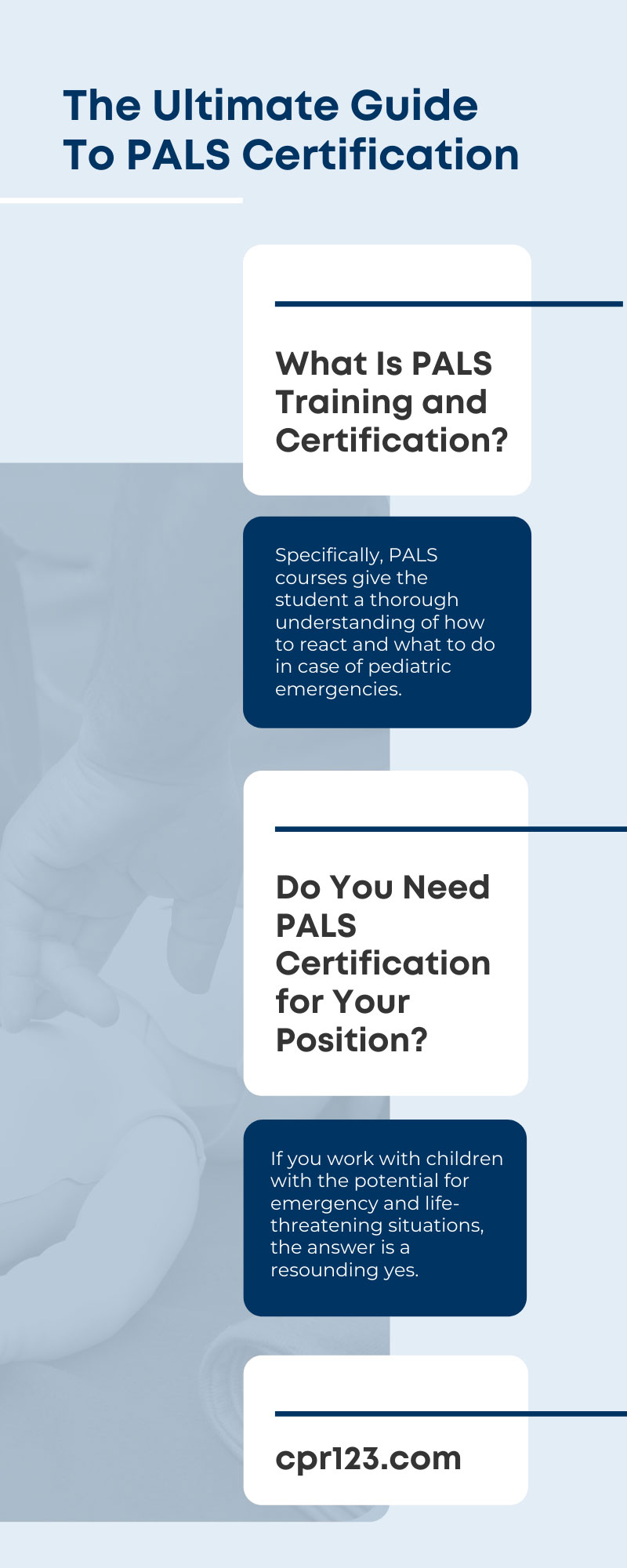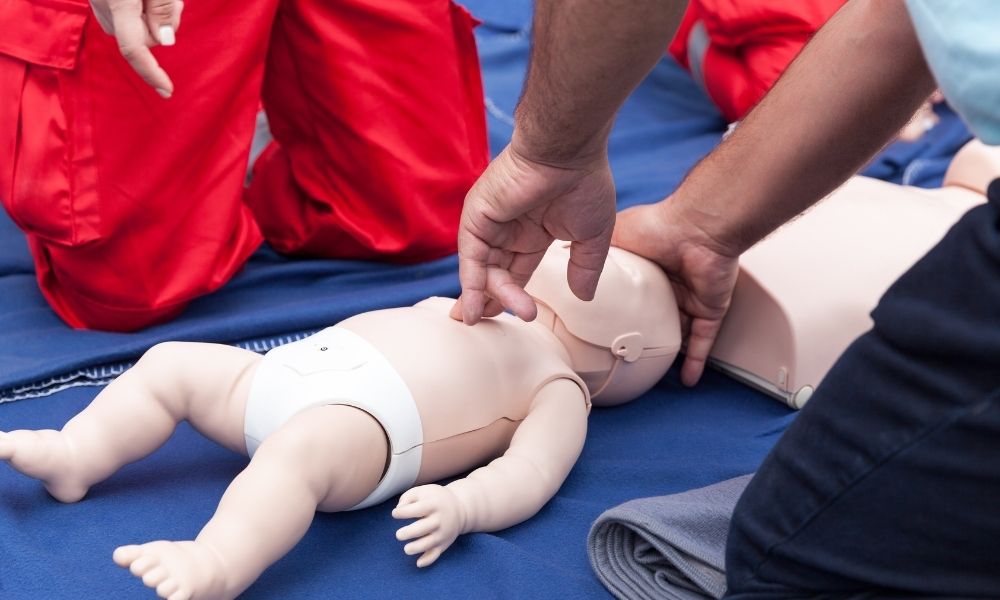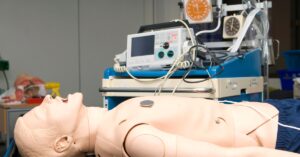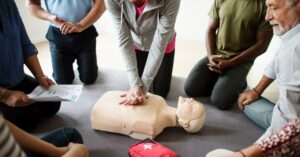If you plan to pursue a career in healthcare, whether as a doctor, nurse, or in some emergency medicine capacity, a Pediatric Advanced Life Support (PALS) course and eventual certification are an absolute must. PALS certification shows you’re prepared to engage and assist in medical emergencies affecting children, and unfortunately, that’s a situation that eventually will rather than might happen. In case you’re wondering about your next steps as well as your long-term course of action, here is the ultimate guide to PALS certification to help you get started and keep on track.
What Is PALS Training and Certification?
Specifically, PALS courses give the student a thorough understanding of how to react and what to do in case of pediatric emergencies. Children’s bodies are still growing and are therefore different from those of adults, so they require more specific methods of care. Trainees gain information on how to identify emergency situations, as well as how to assess the level of danger the patient is in. Training also focuses on the treatment of injuries and events like shock, cardiac arrest, breathing issues, as well as procedures to implement once resuscitation is achieved. In short, trainees learn how to keep children alive and ensure they continue to thrive.
First Steps
This wouldn’t be the ultimate guide to PALS certification without directions on how to find a good PALS course. CPR123, of course, offers online and in-person PALS and other courses, though most facilities require live training and certification to qualify. CPR123 PALS course instructors educate through lecture and example. Simulations also give hands-on experience in dealing with pediatric emergencies like shock, seizures, breathing issues, cardiac arrest, and others. A systemic approach is stressed involving proper assessment of a situation, basic life support and resuscitation techniques, and working with a team to ensure survival. Finding a course that outlines and highlights these things is vital in the literal sense of the word.
Do You Need PALS Certification for Your Position?
If you work with children with the potential for emergency and life-threatening situations, the answer is a resounding yes. Pediatric departments, schools, daycare facilities, and other environments that hire doctors, nurses, and other healthcare providers to supervise and mind the care of children may require a PALS certification. Some healthcare providers may have less contact with pediatric patients, but being capable of lending aid or direct care to child patients in worst-case scenarios can still help you career-wise. If you’re uncertain whether your job needs PALS certification, schedule an appointment with your employer to review your position’s requirements, as well as other training you may need, like advanced cardiac life support (ACLS) and basic life support (BLS).
What Do You Need To Do To Achieve Certification?
Like any course of study, PALS certification training requires a clear mind, active participation, and boundless curiosity. Passivity is not rewarded, so participate in class, asking questions and requesting clarifications from the instructor as necessary. Be ready to talk to your fellow students as you discuss approaches to hypothetical situations.
One of the biggest goals of PALS training and certification is to learn how to work with and as a team. Bring your own experiences and previous learning to the mix, as it’s important to know how to diagnose and provide medication and treatments. Reading and practice tests outside the course can also help improve your chances of achieving certification the first time. Also, be prepared to bone up on and memorize the assorted algorithms and acronyms you pick up during the course. It’s a good idea to concentrate on algorithms for post-resuscitation care, cardiac arrest, and especially pediatric basic life support. Keep in mind that it’s always wise to assume that whatever you hear or experience during the class will certainly be on the final test.
What Happens During PALS Testing and How Can You Prepare?
You will be evaluated for your knowledge and skills on a multi-question test which will be reviewed and evaluated by your instructor. If you fail to pass, you may have the opportunity to retake the exam, but it’s best to aim to pass the first time. Get a good night’s sleep the day before, eat a nourishing meal beforehand, and try not to overdo your study sessions and caffeine intake despite the urge to cram and guzzle coffee. Speaking of study sessions, regularly get together with your fellow students to quiz one another and discuss procedures, algorithms, and the like.
What Are Your Options for Training?
The best course of action for PALS training is a live and in-person course. If one hasn’t been scheduled already, it’s worth mentioning the possibility to your employer. They might already have a budget set up for certification and ongoing education and may be willing to send you to a facility or arrange for classes on-site. While online courses are available, most organizations and healthcare facilities require live and in-person training, testing, and evaluations to meet their PALS certification requirements. On the other hand, online PALS certification courses can work as a supplement to your training to ensure you’re picking up the individual skills and knowledge that you need to succeed and pass the test.
How Long Does PALS Certification Last?
On average, a PALS certification lasts two years—but check the requirements and renewal rules in your region to be sure. When it expires, you can take a PALS recertification course to renew it, but you may seek recertification whenever you like, and probably preferably before it runs out. Keep records on recertification so it doesn’t sneak up on you and so you can reassure your employer that you will remain certified. Recertification also keeps you apprised of changes in knowledge and procedures regarding pediatric medicine and emergency services.
If you want to learn more about PALS, BLS, ACLS, and other courses offered by CPR123, please visit the rest of our site. For more information on our courses and other products and services, contact us through our website, reach out at [email protected], or call us at (844) 427-7123. We look forward to speaking with you and discussing the next steps in your career!








